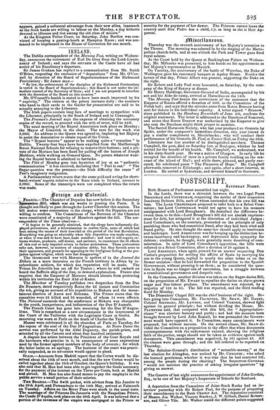jforeign anti Colonial. FRANCE.—The Chamber of Deputies has now before
it the Secondary itittstratatiott,Bill, Winch was six weeks in passing the Peers. It is thought not likely to pass through the Lower Chamber this session. The bill makes some concessions to the clergy, which the Deputies are not willing to confirm. The Committees of the Bureaux of the Chamber were constituted of a majority of Members against the bill. The cor- respondent of the Times observes- " It begins to be generally admitted, that the clergy have indiscreetly dis- played pretensions, and a determination to realize them, some of which had been among the causes of their downfall at the period of the first Revolution. Everything was going on admirably when this disposition was made manifest, or when it was said to have been made manifest ; and now it will require ex- treme wisdom, prudence, self-denial, and patience, to counteract the ill effects of this real or only imputed return to former pretensions. Those pretensions refer not, however, to matters of education solely, but they furnish arms to their opponents, and grounds for appealing to the irreligious feeling or the pre- judice against'religion, which were fast disappearing."
The threatened war with Morocco is spoken of in the Journal des Debats as a mere incursion on the French territory in Africa by in- subordinate soldiers, for which due reparation will be made. The Prince De Joinville has set off for Toulon ; where he will embark on board the Suffrein ship of the line, to demand explanation. France also requires that the Emperor of Morocco should abstain from protecting within his territories the Emir Abd-el-Kader.
The Meniteur of Tuesday publishes two despatches from the Due De Nemours, dated respectively Batua the 2d instant and Constantine the 9th, giving an account of his expedition to Biskara and the moun- tainous districts of Aures and Belezma. The Prince states that the casualties were 23 killed and 92 wounded, of whom 14 were officers. The National contends that the misfortune at Biskara was chargeable to the youth, inexperience, and indiscretion of the Due D'Aumale.
The French Court has gone into mourning for the Due D'Angou- leme. This is remarked as a new circumstance in the intercourse of the Court of the Tuilleries with the Legitimist Court at Goritz. No mourning was worn at Paris on the death of Charles the Tenth.
Masses were celebrated in all the churches of Paris on Tuesday, for the repose of the soul of the Due D'A ngouleme. At Notre Dame the service was performed by the Abbe Deguerry, the parish-priest, and -attended by all the Canons and about four hundred assistants.
A dispute has arisen between the President of the Cour Royale and the banisters who practise in it, in consequence of some expressions used by the former against members of the body of avocats ; for which the latter insist on an apology. The business of the court was practi- cally suspended, as no advocates would appear to plead.
SPAM—Accounts from Madrid report that the Cortes would be dis- solved about the 10th of next month, and that the new Cortes would be called together about the 10th of October, the Queen's birthday. It was also said that M. Mon had been able to get together the funds necessary for the payment of the interest on the Three per Cents, both at Madrid and abroad. M. Mon has also found means to pay the employes in the public service a small portion of their salaries.
Tun BRAZILS.—The Swift packet, with advices from Rio Janeiro to the 29th. April, and Pernambuco to the 14th May, arrived at Falmouth on Tuesday. Affairs-on the River Plate were much in the usual state. The marriage of the Princess Da Januaria with the Neapolitan Prince, the Conde D Aquila, took place on the 28th April. It was believed that a portion of the revenues of the empire was mortgaged to the Prince as security for the payment of her dower. The Princess cannot leave the country until Don Pedro has a child, i.:e. as long as she is Heir Ap- parent.


























 Previous page
Previous page